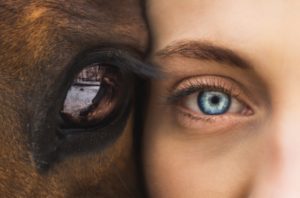Just Deserts
Sometimes the inside of my own head astonishes me. It’s amazing how much of our internal framework is undetected bullshit that runs our lives. For example, this is a belief I’ve always accepted without ever thinking about it:
I get what I deserve
I deserve what I get
I have it,
therefore I deserve it
I deserve it
because I have it.
You have not got it
therefore you do not deserve it
You do not deserve it
because you have not got it
You have not got it
because you do not deserve it
You do not deserve it
therefore you have not got it.
—R.D. Laing, Knots
This piece of nonsense masquerades as a Universal Law, and I believed it!
So, what does it mean to deserve something?
Interestingly, the word “deserve” comes from the Latin word “deservire,” meaning “serve well or zealously” (Oxford online dictionary). Serve as in servant? Serve as in slave?
Serve, as in somebody else has the power to judge the value of our service, regardless of how we evaluate it?
Now, there’s a slippery slope of disempowerment!
The more I mull this over, the clearer it is to me that being judged as deserving or undeserving is a human construct. It’s not real. It collapses when I try to examine it. Do we really believe we get exactly what we deserve? Children are starving because they deserve to? People die of cancer because they deserve it? One percent of the population has most of the financial resource because they deserve it and the rest of us don’t?
No. I don’t believe that.

My reading of current complex systems science (please see my Resources page) teaches me life is defined by living. Life wants to live, be it a bacterium, a fern, a woodpecker, or a human being. Life is persistent, adaptive, and depends on the passing on of genetic material and energy gradients. Life is solely occupied with meeting its needs for life, and most successful life teams up with other kinds of life in complex systems.
There is no deserve in all that. There is no implicit guarantee of rights or resource. Successful life often leads to population overshoot, at which point the successful species uses up its resource and predators of the overshoot population increase their population to take advantage of the abundant food and energy supply.

I did nothing to deserve the circumstances of my birth as a white female in the United States. I’m no more or less deserving of life than a mycelium spore. If I die of some kind of drug-resistant organism, my death is nothing more or less than the inevitable consequence of my species being in overshoot.
We humans spend a lot of time fighting with one another, as any overcrowded population will. There’s current buzz about hate, oppression, immigration and white supremacy. My own view is that all those issues are not the root of the matter, but distractions. The real issue is our unconscious and false sense of ourselves as human supremacists, superior to the sacred cycles and processes of life and death. Most of us believe, behave, and act as though our needs are more important than the needs of other human beings, and certainly more important than the needs of all the other countless and magnificent forms of life with whom we inhabit this planet.

We will discover — we are discovering — we cannot stand alone, however. In fact, most life on the planet can do much better without us than we can do without it.
Life and death are the context in which all our experience is embedded. We’ve only begun to identify some of the laws governing the way they work together. We’re only now realizing how interdependent all forms of life are, even as we actively destroy other species we depend upon for food and water.
As human beings, we have needs. If our needs don’t get met, we die. This is so for every form of life. We either live as part of a sustainable complex system or we die as a species. As individuals, we are born and live because of those who have died before us, and our inevitable death gives life to those who come after us. It’s really very simple. Debating whether we ourselves or any other form of life is deserving or not is an idiotic waste of time and energy.
The concept of deserving is one more piece of mental clutter, along with pleasing others and arguing with what is, I’m ready to let go. For years I’ve hurt myself with it; it’s limited me and been a heavy burden to carry. Without it I feel lighter, freer, and I notice an increased sense of reverence and gratitude for my life and all the life around me. I am not supreme. I’m a child, a student, and one small life among many others, all of which have equal value to my own and much to share and teach, if I can set my human arrogance aside long enough to listen.
As Loren Eisley writes in All the Strange Hours: “Life, life for the purposes of life, and is that then so small?”
